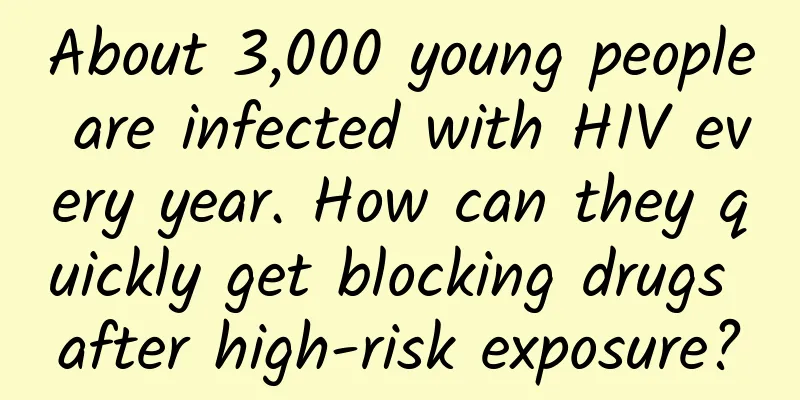About 3,000 young people are infected with HIV every year. How can they quickly get blocking drugs after high-risk exposure?

|
Recipient: Little Agent Old Detective Theme: AIDS It's time to go to the Alpha Technology Intelligence Station again. When I got off work on Friday, our medical science planner Sister Pu said to me: "Don't take a rest this weekend, write some topics related to AIDS. Send them to me when you are done, because you can't miss the push from the General Administration on Saturday. You know. It's okay to be late, but you can't miss it." At that time, my inner barrage was filled with this expression -, because I had an appointment with Fatty to play basketball on the weekend, that guy is too lazy, I have to help him increase his exercise. Who knew that after waking up in the morning, I paid attention to a piece of information and really wanted to start writing. Because the situation of AIDS prevention is urgent. I, Alpha, have to keep up with the popular science. The Office of the Healthy China Action Promotion Committee recently held a press conference. At the meeting, Liu Zhongfu, director of the AIDS Prevention and Control Group of the Chinese Center for Disease Control and Prevention, answered reporters' questions about AIDS prevention and control among young students and said, In recent years, the number of cases reported among young students aged 15 to 24 has generally been around 3,000 per year. To prevent AIDS, we need to work at multiple levels, including individuals, society and the government, to promote behavioral changes and enhance self-protection awareness. Alpha feels that this issue can be addressed directly. The difficulty in preventing and controlling AIDS lies in the fact that it cannot be cured and is difficult to control. Once the arrow is shot, there is no turning back. At present, the world has not yet developed a drug that completely cures AIDS, nor a vaccine to prevent it. Under the current international medical level, AIDS patients or infected people must use antiretroviral drugs for life. We are all responsible for our health. Understanding, enhancing knowledge reserves and taking responsibility for ourselves are what we have to do throughout our lives. There are three main ways that AIDS is transmitted: 1. Blood transmission The human body is at risk of contracting AIDS if it is transfused with blood or blood products containing the HIV virus, takes intravenous drugs, or receives tissues and organs from infected people or AIDS patients. 2. Mother-to-child transmission Pregnant women infected with HIV can pass the virus to the fetus during pregnancy and delivery, and infected mothers can pass the virus to their babies through breastfeeding. 3. Sexual transmission HIV exists in the semen and vaginal secretions of infected people. Sexual behavior can easily cause minor damage to the skin and mucous membranes, and the virus can enter the blood through the damage and infect. Both heterosexual and homosexual sexual contact can lead to the spread of AIDS. There are a large number of viruses in the semen or vaginal secretions of people infected with AIDS. During sexual activities, including vaginal intercourse, anal intercourse and oral sex, it is easy to cause minor damage to the genital mucosa due to friction in the intercourse area. At this time, the virus will take advantage of the opportunity to enter the blood of uninfected people. It is worth mentioning that because the intestinal wall of the rectum is more easily damaged than the vaginal wall, the risk of anal intercourse is greater than that of vaginal intercourse. From the chart of the proportion of transmission routes of newly discovered HIV infections in the first quarter of 2018, we can see that sexual transmission has become the main mode of transmission because of its high concealment. Among all HIV transmission routes, sexual transmission accounts for more than 90%. From everyone's perspective, AIDS can be prevented through fundamental measures, so we can do the following in our daily lives: 1. Use disposable syringes and blood and blood products that have been tested for HIV antibodies. 2. Refuse drugs and avoid sharing syringes. 3. Pregnant women infected with HIV should take active medical measures to prevent the fetus from being infected. 4. Be chaste and have a sense of sexual morality. 5. Treat sexually transmitted diseases early to reduce the risk of infection. 6. Consciously and correctly use condoms. Contraceptive methods such as sterilization and IUD insertion cannot prevent AIDS. Alpha has summarized three common questions about AIDS that most people don’t understand, and will answer them here. Q: If you are infected with HIV, does that mean you have AIDS? A: No. HIV is the human immunodeficiency virus, and AIDS refers to the final stage of HIV infection. After being infected with HIV for 2-10 years or even longer, the human body will develop into AIDS because the immune system is devastated. In the late stage of the disease, serious infections and malignant tumors will occur. Q: Are condoms not reliable enough to isolate HIV? A: No. Condoms of good quality and produced by regular manufacturers can effectively isolate HIV and greatly reduce the risk of sexual behavior. There is evidence that male latex condoms have a protection rate of more than 85% against HIV and other sexually transmitted diseases. Q: Will you be infected with HIV by using public toilets, swimming pools, baths, etc.? A: Generally not in a normal lifestyle. Shaking hands, hugging, kissing, sharing toilets and bathtubs, eating at the same table, sharing tableware, coughing or sneezing, using public swimming pools and baths, and other daily contacts generally will not infect you with HIV. HIV has a very weak ability to survive outside the body, and generally ordinary contact will not spread HIV. "After an accident, you can use HIV blocking drugs to avoid infection." Every time the science popularization of blocking drugs, many people react with confusion. The popularity of PEP blocking drugs in China is not high. Even in high-risk groups in big cities, not everyone knows about it. In some small cities, there may not be one or two blocking cases a year. The most prominent problem with PEP blocking drugs in practice is the low awareness rate among the target population. Therefore, medical and health science popularization really needs to be persisted. HIV blocking drugs, also known as post-exposure prophylaxis, are called PEP in English. After the HIV virus invades the human body, it takes time to break through the immune system's defenses and reach the blood, and this period of time is the key to blocking the virus. Within 72 hours of high-risk exposure behavior, it can help people effectively prevent HIV infection. But I heard from Alpha that the sooner you start, the better. The sooner you start, the better. The sooner you start, the better. Important things should be said three times. The best effect is within 2 hours, preferably no more than 24 hours. Taking it within 72 hours is the golden time for prevention. Now here comes the point: once high-risk behavior or occupational exposure occurs (medical staff, police, etc.), how can we quickly get HIV prevention drugs? 1. Ways for ordinary people to get blocking drugs after high-risk exposure If ordinary people are suspected of high-risk exposure to AIDS (mainly high-risk sexual behavior), they should visit the infectious disease department, dermatology department (normal working hours) or emergency department (non-normal working hours) of local infectious disease hospitals, or high-end private hospitals as soon as possible, and do relevant tests and risk assessments as soon as possible. The doctor must first assess whether it is necessary and then prescribe it. Purchase it with the prescription, and do not buy it on your own. In addition, ordinary people need to pay for blocking drugs at their own expense. 2. Ways to get blocking drugs after occupational exposure Medical personnel, police, etc. who are exposed to HIV at work should promptly go to the nearest medical institution for local emergency treatment and report to the employer within 1 hour. The employer will report to the disposal agency within 2 hours after the exposure occurs, and provide relevant materials to cooperate with the disposal work. The success rate of blocking drugs is relatively high. According to statistics, every year in my country, 700 to 1,000 doctors, police officers, etc. take blocking drugs due to accidental contact with the blood of AIDS patients or HIV-infected people at work, and none of them is infected due to occupational exposure. HIV blocking drugs are generally a combination of different antiviral drugs. They are divided into recommended regimens, single-drug regimens, and alternative regimens. In order to reduce the adverse reactions caused by drugs and improve the convenience of medication, major hospitals will give priority to recommended regimens or single-drug regimens when the supply of drugs is guaranteed. When one or more drugs in the recommended regimen or single-drug regimen are not available locally, an alternative regimen will be selected. There are some issues that need to be paid attention to when using HIV blocking drugs. Take a closer look: 1. After high-risk behavior, you need to go to a regular hospital or disease control department for a professional to conduct an infection risk assessment. If the exposure source is assessed to be HIV positive, post-exposure prevention is required; if the HIV infection status of the exposure source is unknown, but you highly suspect that you are at risk of exposure, you also need to undergo post-exposure prevention; if the exposure source is assessed to be HIV negative, it is not necessary. 2. Patient compliance during the treatment of blocking drugs is very important. The drug must be used for a full 28-day course of treatment. If the treatment is less than 28 days, the success rate of blocking will be greatly reduced. At the same time, it is not recommended to extend the course of treatment. If you delay or miss taking medication, you need to take it immediately as long as it does not exceed half of the interval between doses; if it exceeds half of the interval, you do not need to make up for it, and you can take the medication on time and in the right amount next time. 3. Before blocking treatment, you need to complete blood routine, liver and kidney function, and screen for syphilis, hepatitis B, hepatitis C and other diseases that have similar transmission routes as AIDS. In addition, women need to undergo a pregnancy test. During treatment, you need to regularly review liver and kidney function and monitor the side effects of the drugs. Generally, the safety of the medication is evaluated after 2 weeks of treatment; in addition, you need to test HIV antibodies after 4 weeks, 8 weeks, 12 weeks and 24 weeks to evaluate whether the blocking is successful. It is worth noting that HIV blocking drug treatment cannot 100% prevent HIV infection. The success or failure is related to many factors, including the timing of blocking, the type of blocking drug used, whether the patient takes the full course of treatment, regularly, and continuously, and whether the patient continues to engage in high-risk behaviors. Therefore, whether blocking can be successful requires individual analysis, and high-risk behaviors must be avoided during treatment. Ok, today's intelligence interpretation ends here. If you still have questions, you can leave a message under any article. Welcome young agents and old agents to provide intelligence to Alpha at any time, let us work together to be the sober people in this world. Use strength to make feelings come true. If one day you find that I have bowed my head in front of mediocrity, please shoot me. |
<<: Does "sleep paralysis" really exist? Narcolepsy, check it out
>>: How to make chrysanthemum tea? What are the benefits of drinking chrysanthemum tea?
Recommend
Red pimples on private hair
For many female friends, if there is discomfort i...
What does a negative urine test mean?
Urinalysis is a very common test in our lives. Th...
What to do with advanced ovarian cancer? Is treatment still effective?
Ovarian cancer is one of the most common malignan...
How to play chess to gain an advantage at the beginning? Order of chess
When playing chess, cannons, horses, and chariots...
Causes of menstrual pain
Dysmenorrhea is like hell for girls. When I have ...
Dry skin on nipples during pregnancy
Why do women have dry skin on their nipples durin...
What nutrients does longan contain? What are the benefits of longan?
The dried pulp of longan is called longan meat. It...
What are the necessary tests before pregnancy?
For ladies who are preparing for pregnancy, what ...
What should you prepare for during early pregnancy?
Pregnancy is the most important thing in every gi...
Is it normal to have frequent fetal movements at 24 weeks of pregnancy?
Fetal movement refers to the fetus kicking and ru...
Can custard powder be added to croquettes? What is the effect of custard powder in croquettes?
We all know that croquettes are a common home-coo...
What is the meaning of National Day? 2022 National Day greetings to friends
During the National Day, there will be a display ...
Does calcified breast nodules require surgery?
Calcification of breast nodules is a relatively c...









